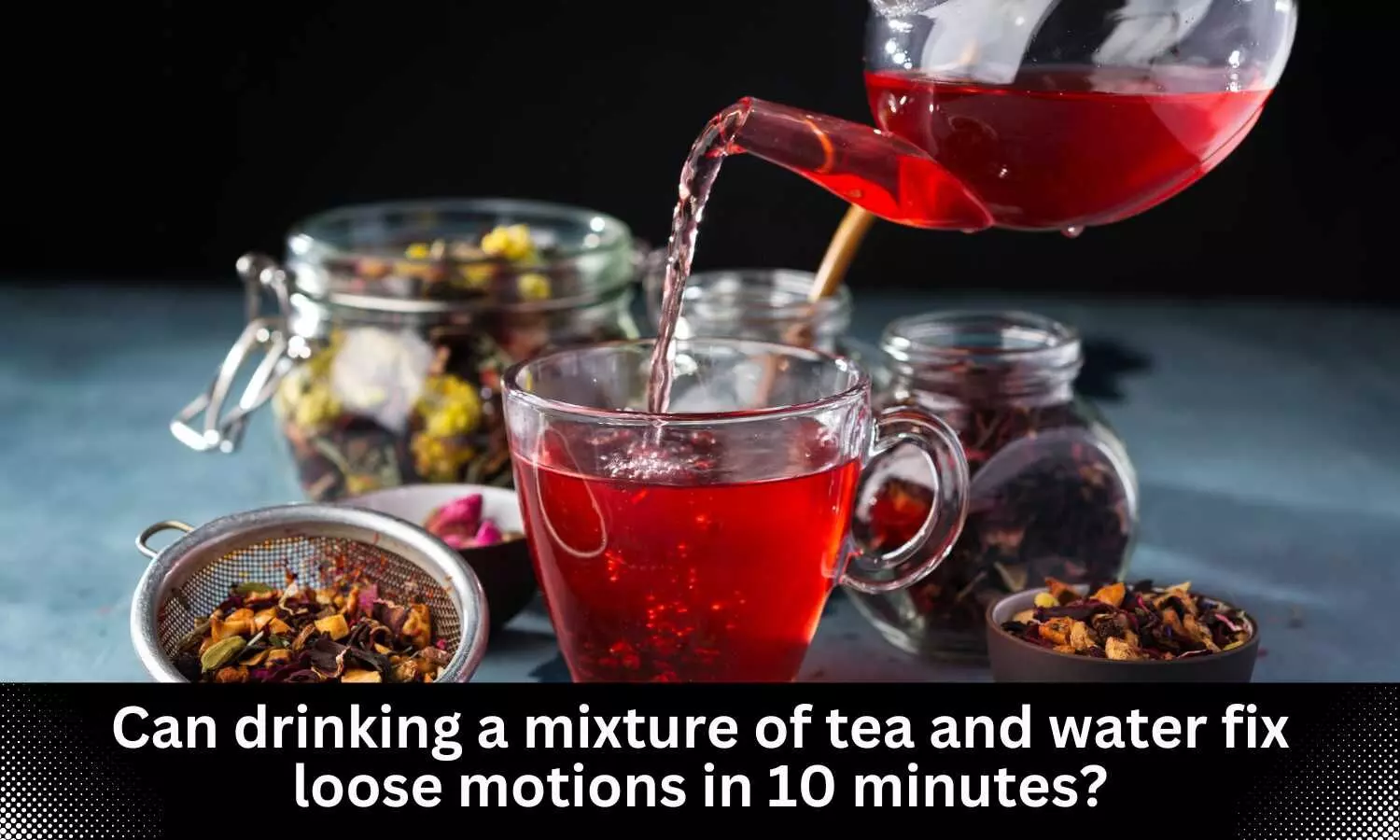Fact Check: Can drinking a mixture of tea and water fix loose motions in 10 minutes?

A recent Instagram post claims that drinking a mixture of tea and water is an instant solution to fix lose motions in 10 minutes. This post is false.
Claim
An Instagram post by use manjumittal.homehacks claims that drinking a mixture of tea and water provides instant relief to loose motions. The Instagram post by Manju Mittal titled "motion theek karne ka instant solution 😳" ( instant solution to fix loose motions) sees a video where a man and a women are chatting. The man complains that he is suffering from loose motion and hence does not want to go anywhere. The women then calls it excuse, further taking half a glass of tea and half a glass of water and shuffling the mixture thoroughly and giving it to the man. She then goes on to explain that this is a trusted formula for fixing loose motions. She goes on to advice that if one is ever suffering from loose motions then one should drink this mixture and it will provide you relief from loose motion within 10 minutes.
The post has 47,137 likes and can be assessed here
Fact Check
This claim is False. No evidence supports that the mixture of tea and water is a instant fix to loose motions that too in 10 minutes. Drinking fluids might help with the dehydration related to loose motions but to say that it will fix lose motions is false. Further, The post suggests an immediate remedy that may lead people to delay seeking appropriate medical treatment. This could be risky, especially if the diarrhea is due to a serious infection or underlying condition that requires medical intervention.
Understanding Diarrhea?
Loose motions is also called Diarrhea. According to the World Health Organization(WHO), diarrhea is the passage of three or more loose or liquid stools per day (or more frequent passage than is normal for the individual). Diarrhea is not a disease but it is a symptom of an infection in the intestinal tract. It is caused by bacterial, viral and parasitic organisms. Infection is spread through the consumption of contaminated food, drinking contaminated water, or from person to person as a result of poor hygiene. It is the second leading cause of death in children under five years of age and was responsible for the deaths of 370,000 children in 2019. Dehydration is the most severe threat posed by diarrhea. During the episodes of diarrhea, electrolytes are lost through liquid stools, vomit, sweat, urine and breathing. Major water and electrolytes including sodium, chloride, potassium and bicarbonate are lost due to diarrhea. When these losses are not replaced then the person with diarrhea becomes dehydrated (1)
Etiology of Diarrhea
Based on duration and type of symptoms diarrhea is categorized into acute or chronic diarrhea and infectious or non-infectious diarrhea.
Acute Diarrhea refers to diarrhea in which episodes last less than two weeks. It arises due to infection mostly viral infection and the course is self-limited. The majority of episodes of acute, watery diarrhea are caused by viruses (viral gastroenteritis). Rotavirus is the most common in youngsters, but norovirus is prevalent in adults. (5)
Chronic Diarrhea refers to diarrhea in which duration lasts longer than two weeks and tends to be non-infectious. Common causes include malabsorption, inflammatory bowel disease and medication side effects. (2) Chronic diarrhea occurs due to inflammatory bowel disease (IBD), which is ulcerative and Crohn's disease.
Symptoms of Diarrhea
As per the National Institute of Diabetes and Digestive and Kidney Disease the main symptom of diarrhea is the passing of loose watery stools three or more times a day. People with diarrhea may also have one or more of the following symptoms which include Cramping, Abdominal Pain, loss of control of bowel movements, Nausea, Vomiting and Dizziness. Diarrhea may further cause dehydration and malabsorption. (3)
Complications of Diarrhea
According to National Institute of Diabetes and Digestive and Kidney Disease there are two complications which arises due to diarrhea. These include:-
Dehydration
Diarrhea may cause dehydration, which indicates that the body does not have enough fluids and electrolytes to function properly. In the case of diarrhea, the loss of fluid and electrolytes increases.
Malabsorption
Diarrhea may cause malabsorption. Malnutrition can occur when people do not absorb enough nutrients from the food they consume. Certain chronic diarrhea-causing diseases, such as infections, food allergies and intolerances, and digestive tract disorders, can also induce malabsorption. (4)
What are the preventive measures that can be taken to cure diarrhea at home?
Following are the preventive measures that can be taken to cure diarrhea at home: -
1. Hand Hygiene: Wash your hands regularly with soap and water, especially before eating, after changing diapers and after using the toilet.
2. Safe Water: Consumption of safe drinking water is important. Ensure that water used for cooking and cleaning is safe. It is advisable to boil the water before consumption to eliminate contaminants.
3. Proper Food Hygiene: Practice good food hygiene practices by cooking food thoroughly, avoiding consumption of raw or undercooked eggs and meat, and preventing cross-contamination in the kitchen. Avoid eating food from street vendors,
4. Stay hydrated: Promote the consumption of cleared fluids such as clear soup, broth, diluted fruit juices, and Oral Rehydration Solution (ORS) to promote hydration and maintenance of electrolyte balance in the body.
5. Breastfeeding: Encourage breastfeeding for infants, breast milk provides hydration, important protection against infections and builds immunity.
About Tea
Tea plant Camellia sinensis has been cultivated thousands of years and tea leaves are used for medicinal purposes as well. Tea is used as popular beverage worldwide. Consumption of tea is useful for the maintenance of cardiovascular and metabolic health. On the basis of processing or harvesting tea leaves. They are categorized as black (fermented), green (non-fermented) and oolong (semi-fermented). Across the globe, tea is most common consumable drink. It is a hydrating beverage with different types and flavors. Tea has less caffeine then coffee. One 8 ounce cup of brewed tea contains 47mg and green tea contains 28mg of caffeine. The popular herbal teas such as peppermint or ginger tea are free from caffeine. Flavonoids, Catechins, Polyphenols, Potassium , Phosphorous, Magnesium, Copper , Zinc, Calcium and Fluoride are the important nutrients and minerals found in many teas. (7)
Benefits of Milk Tea
- Tea is rich in antioxidants, and milk is rich in calcium, potassium, and vitamins D and B12, which are important for healthy bones and muscles.
- Tea prepared from low fat milk may be good for skin. Essential fats and antioxidants are present in milk which helps to improve skin health , provide glowing skin and prevent early aging whereas tea leaves are great source of antioxidants.
- Milk tea may have anti-depressant effect due to presence of tryptophan which enhance mood and memory and reduces stress. Milk tea contains caffeine which refreshes the body.
- Consumption of low fat milk in tea helps to reduce weight and caffeine present in tea also helps to lose weight. (6)
Water may provide relief in rehydration but does not cure the underlying disease
Water plays a crucial role in rehydration by restoring the body's fluid balance, especially when fluids lost through sweating, illness, or other factors. It replaces the fluid lost from the body, helping maintain the balance of electrolytes, which are essential for muscle function and other processes which is necessary in case of loose motions. Proper hydration is necessary for digestion, absorption and transportation of the nutrients. The only effective treatment for dehydration is to replace lost fluids and lost electrolytes. The best approach to dehydration treatment depends on age, the severity of dehydration and its cause. Consumption of over- the - counter oral rehydration solution, which comprises water and salt in specific proportions help to replenish fluids and electrolytes in cases of diahrrea.(10) WHO also recommends Rehydration with oral rehydration salts (ORS) solution. ORS is a mixture of clean water, salt and sugar in case diarrhea.
Can Drinking a mixture of tea and water provide relief from loose motion
Water is has a known role in the medical field for the purpose of rehydration in diarrhea. However, there is no evidence that it takes care of the underlying cause of the disease
According to the Harvard T.H. Chan School of Public Health, water plays a crucial role in “nearly all body functions. Water helps to restore fluids lost through metabolism, breathing, sweating, and the removal of waste. It helps to keep away from overheating, lubricates the joints and tissues, maintains healthy skin, and is necessary for proper digestion. (11)
Similarly, tea has also been a subject of study in case of treatment of diarrhea. In 2016, Doustfatemeh S et al published a randomised control trial which concluded that there might be a possible antidiarrheal effect of black tea on Pediatric population With Acute Nonbacterial Diarrhea. The study however, went on to recommend use of this along with conventional drugs At the same time, we could not find any evidence in case of bacterial diarrhea (8)
Tea also contains caffeine and Caffeine consumption has a well-known diuretic effect. Frank & Burkhalter 2020 in their paper on students noted many busy students think that coffee, tea, soda, or energy drinks will provide adequate hydration, but these beverages actually make students thirstier and even more dehydrated. Another paper in 2015 noted that , Green tea is a natural diuretic so; by drinking extreme amounts of green tea (more than five cups /day) it can cause excessive urination leading to dehydration and electrolyte disproportion.
There is no scientfic evidence on the use of tea as a treatment mechanism in case of diarrhea.
Hence it is important to understand that Water and tea can help manage the symptoms of diarrhea, particularly by preventing dehydration, but they do not "fix" or cure diarrhea on their own. Neither water nor tea addresses the underlying cause of diarrhea. If diarrhea is due to an infection, food intolerance, or a medical condition, these underlying issues need to be treated for the diarrhea to resolve.
There is no evidence nor a medical consensus suggesting that drinking a mixture of tea and water can fix lose motions instantly particularly in 10 minutes as the video claims
What do experts say?
The Health Dialogues Fact Check Team spoke with Dr. Arvind Chopra, MBBS, Member Anti Quackery Committee, Delhi Medical Council who responded to the claim, " Diarrhea is a condition characterized by the passage of frequent, loose, watery stools multiple times in a day. It may be because of contaminated food and contaminated water. Drinking water with tea may help you feel better as it will help with rehydration, but it should be a part of a broader rehydration strategy. However, one needs to be careful as well Consumption of caffeinated teas may also worsen dehydration in some circumstances."
"There is no scientific evidence to support that drinking a combination of tea and water will fix diarrhea that too in 10 mins. Treatment of diarrhea typically involves rehydration, consumption of (Oral Rehydration Solutions) ORS or mixture of water, sugar and pinch of salt and in some cases, medication. Such combinations should not replace professional medical advice or treatment. Consult the doctor for proper management rather than relying on unproven remedies".
Medical Dialogues Final Take:
Mixture of tea and water may give some relief in diarrhea by improving rehydration. But this mixture does not replace the recommended medical treatment of using (Oral Rehydration Solutions) ORS or mixture of water, sugar and pinch of salt. Further it does not treat the underlying cause of diarrhea which may be due to multiple reasons. The video portrays this mixture as quick fix for diarrhea stating that it will fix it in 10 minutes but in reality no scientific evidence or medical consensus supports the claim that drinking a mixture of tea and water will fix loose motions that too in 10 minutes. Hence, the claim that drinking a mixture of tea and water provide relief from loose motion is FALSE.
Reference
1. https://www.who.int/health-topics/diarrhoea#tab=tab_1
2. https://www.ncbi.nlm.nih.gov/books/NBK448082/
3.https://www.niddk.nih.gov/health-information/digestive-diseases/diarrhea/symptoms-causes
4.https://www.niddk.nih.gov/health-information/digestive-diseases/diarrhea/definition-facts#:~:text=Diarrhea%20is%20loose%2C%20watery%20stools,goes%20away%20on%20its%20own
5. https://gi.org/topics/diarrhea-acute-and-chronic/
6. https://www.medicinenet.com/what_are_the_benefits_of_drinking_tea_with_milk/article.htm
7. https://www.webmd.com/diet/tea-health-benefits
8. https://www.ncbi.nlm.nih.gov/pmc/articles/PMC5871214/#bibr11-2156587216654600
9. https://www.researchgate.net/publication/9071298_Mechanisms_of_Cancer_Prevention_by_Tea_Constituents
10. https://www.mayoclinic.org/diseases-conditions/dehydration/diagnosis-treatment/drc-20354092
11. https://nutritionsource.hsph.harvard.edu/water/



